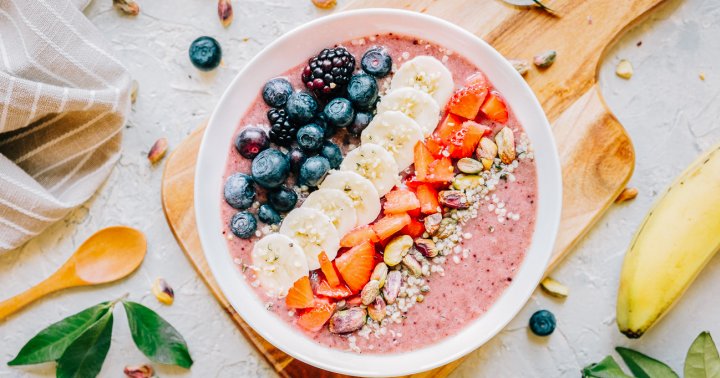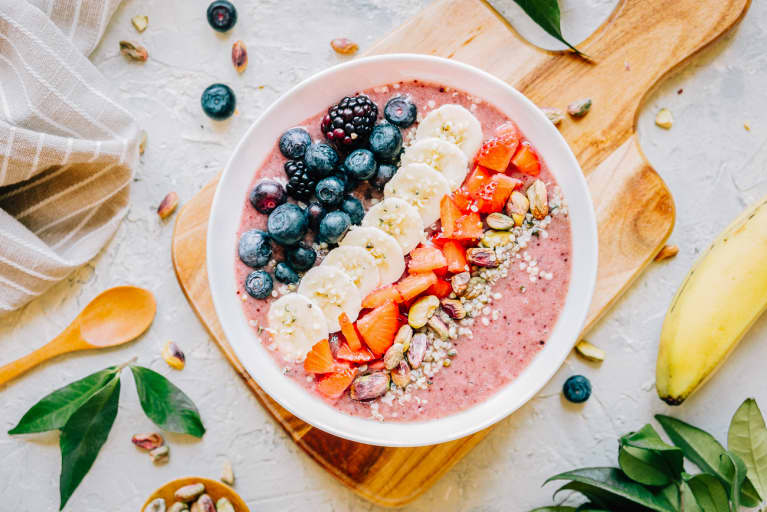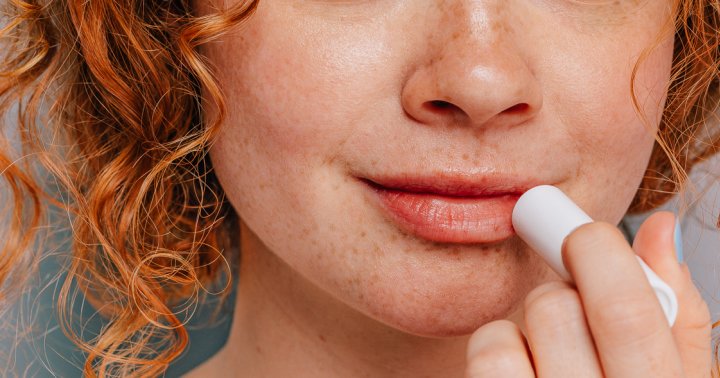4 Things This Gastroenterologist Does Every Single Morning For A Healthy Gut
From hot coffee to cold plunges.


Our editors have independently chosen the products listed on this page. If you purchase something mentioned in this article, we may earn a small commission.
At mbg, we like to think about health holistically. In other words, a new chin breakout, lack of energy, and stomach bloat may all be caused by the same underlying issue. In many cases, that issue lies in the gut microbiome.
Knowing that gut health is important is one thing, but actually understanding how to maintain it is essential. To give us some inspiration, gastroenterologist Will Bulsiewicz, M.D., MSCI, shares the four things he does every morning to promote his own gut (and overall) health:
Most mornings can benefit from a cup of coffee, but that doesn't mean every morning should start with a cup of coffee.
"Something that's become a big game-changer for me is starting the morning off with two large glasses of water," Bulsiewicz tells mbg. "I have not given up coffee. I will not give up coffee. I've just found that my body responds better when I reach for water first."
Think about it. To avoid waking up in the middle of the night to pee, urologist Vannita Simma-Chiang, M.D., recommends taking a final sip of water about three hours before bed. If people follow that rule, by the time they wake up, about 11 hours will have passed without any source of hydration.
"Your body needs that water to start working properly," Bulsiewicz says. "My brain, my gut, and my kidneys all seem to function better when I start with water instead of coffee."
Step 2: Drink (and enhance) a cup of coffee.
After he drinks 12-ounce cups of water, Bulsiewicz then moves on to coffee—and not just any boring old brew.
"I'm all for flavoring," he tells mbg. "I think coffee can be a vehicle for good, so what I'll often do is add to my coffee, depending on my mood." That said, when coffee is filled with creamers or sugar-laden flavor enhancers, it can wreak havoc on the gut. Instead, he adds natural spices or adaptogens, including:
Step 3: Eat breakfast...well, sometimes.
"Like every other part of our body, the gut needs time to rest," Bulsiewicz explains. Which is why he follows an intermittent fasting plan. Well, for the majority of the week, at least.
"I don't think we need to have rigid requirements for the 16:8 fast; you can just do it on the days when it feels right," Bulsiewicz says. For him, weekday mornings are usually too busy to make time for breakfast, so saving lunch for midday just happens. On the weekends, though, he'll usually eat a morning smoothie bowl.
Dr. B's go-to smoothie formula:
"One of the secrets to making it a bowl is freezing the bananas, which turns it into a sort of nice cream," he explains. He'll then top the bowl with more fresh fruit, hemp seeds, walnuts, or granola.
Step 4: Jump in a freezing cold pool.
OK, so this one may not benefit the gut, per se, but it is a new trick Bulsiewicz is trying each morning. "For me, the way that I feel [after jumping in cold water] is distinctly different. I feel like it turns on my brain and shocks my body into being awake and alert," he says. Once he's in the pool, he'll will swim around for about 30 seconds before toweling off.
"I'm becoming increasingly interested in how we can use temperature to affect the way that our body works, whether it be heat or cold," he explains. "I think there's a lot of interesting science that's starting to come out about the benefits on both sides."
No pool? No worries. A cold shower can probably do the trick. We also rounded up a list of the best cold plunge tubs, if you're interested.
Committing to healthy habits—like an established morning routine—is the first step toward overall health. "At the end of the day, diet and lifestyle are what's going to drive the health of your gut," he says. Adding in daily probiotic supplements may be the next step.
"If the goal is to have a healthy gastrointestinal (GI) tract and overall immune system, you want to make sure you're constantly taking good-quality probiotics,"* integrative medicine doctor Bindiya Gandhi, M.D., previously told mbg.
Just keep in mind: "You can't out-supplement your diet," Bulsiewicz says. "A supplement should be, as the word describes it, a supplement." In other words, a good probiotic can be a fantastic way to introduce good bacteria to the gut, but it should always be a part of an overall healthy lifestyle.*
If you are pregnant, breastfeeding, or taking medications, consult with your doctor before starting a supplement routine. It is always optimal to consult with a health care provider when considering what supplements are right for you.
And do you want to turn your passion for wellbeing into a fulfilling career? Become a Certified Health Coach! Learn more here.
https://www.mindbodygreen.com/articles/gastroenterologist-morning-habits-for-a-healthy-gut

 Aliver
Aliver 
























![Are You Still Optimizing for Rankings? AI Search May Not Care. [Webinar] via @sejournal, @hethr_campbell](https://www.searchenginejournal.com/wp-content/uploads/2025/06/1-1-307.png)





.jpeg?trim=0,89,0,88&width=1200&height=800&crop=1200:800)

